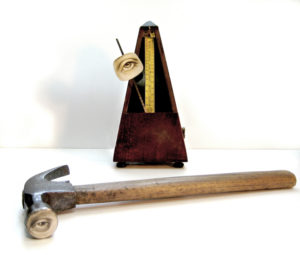Metronomes can be a drag, there’s no doubt about it. They have a way of interrupting that perfect timing you’ve established for yourself and causing you to question everything you’ve ever known to be true. Honestly, metronomes are lucky they don’t all end up in pieces beside the wall they’ve been thrown at. Metronomes should be thanking us. Well maybe there’s a way you can develop a better relationship (or maybe one at all?) with your metronome because it can be a key ingredient to playing music with actual humans.

Metronomes Are People Too
Try thinking of the metronome as a stand-in for another person because that’s essentially what it is. A concert cellist doesn’t spend hours practicing to a metronome so that she can perform in a concert hall with a metronome. She practices to a metronome so that she can perform along with other musicians. The purpose of a metronome isn’t primarily to teach you how to play in perfect time, although it can certainly help with that. The purpose of a metronome is to teach you to listen and adapt your playing to someone (or something) else. That someone could be a drummer, a bass player, a singer, another guitar player or that Grateful Dead bootleg from ’72.
Music is For Mistakes
It’s amazing how many people aren’t aware how often mistakes are going on in the music around them. Musicians are constantly self-correcting their own playing or adjusting to the fluctuations in the playing of others. The secret is this: Once you get really good at it, no one notices the corrections. Or even better, they think it was all part of the plan. You get so proficient at self-correction that the adjustments are happening almost constantly. If you become only moderately proficient at playing with a metronome, it will make you vastly better at playing along with other people. The reason for this is, unlike most people, the metronome is nearly perfect and completely unforgiving. When you play with other humans, they will naturally adjust to you and vice versa and that makes it easier and more enjoyable for everyone. The metronome just helps you begin and hone that process of listening and adjusting to others.
Now Forget Everything
One extra bit of advice: Don’t overdo it with the metronome! This really isn’t a problem for most people but it bears mentioning. Too much metronome use can be frustrating and counterproductive. One suggestion is to try playing the same practice piece once with the metronome and once without, or some version of that process that fits with your practice flow. You need to have the space to enjoy yourself and to play at your own pace. Remember, the goal is not to achieve perfect timing but to build your skill at listening and adapting your playing.
